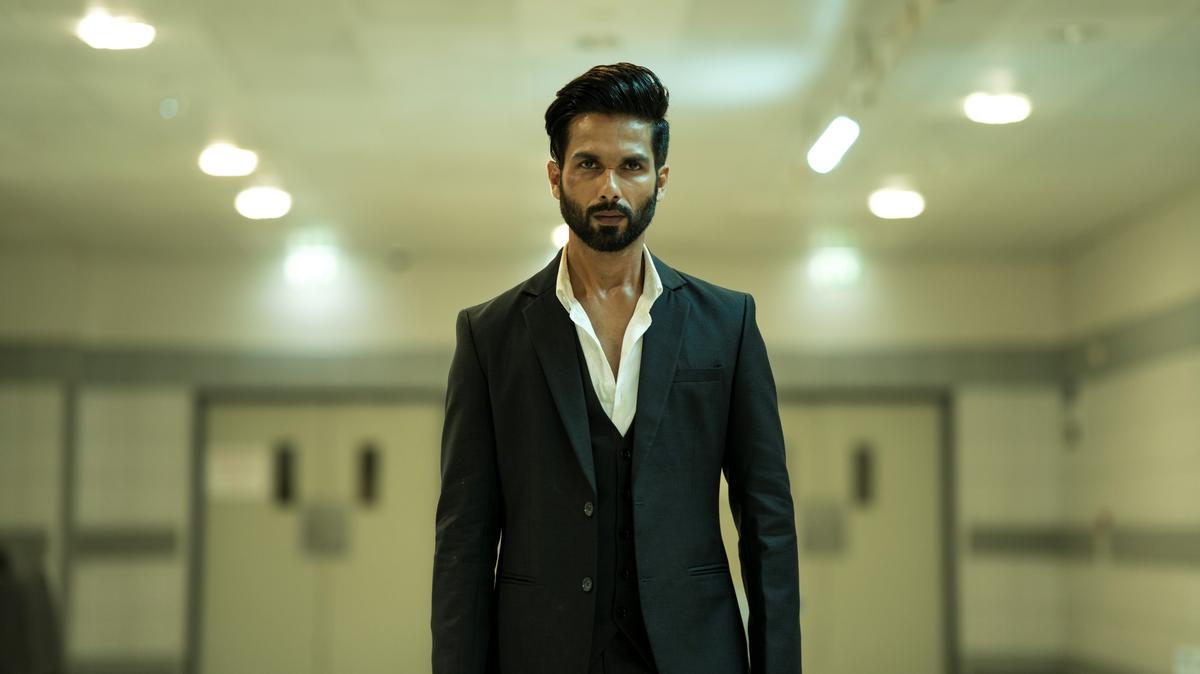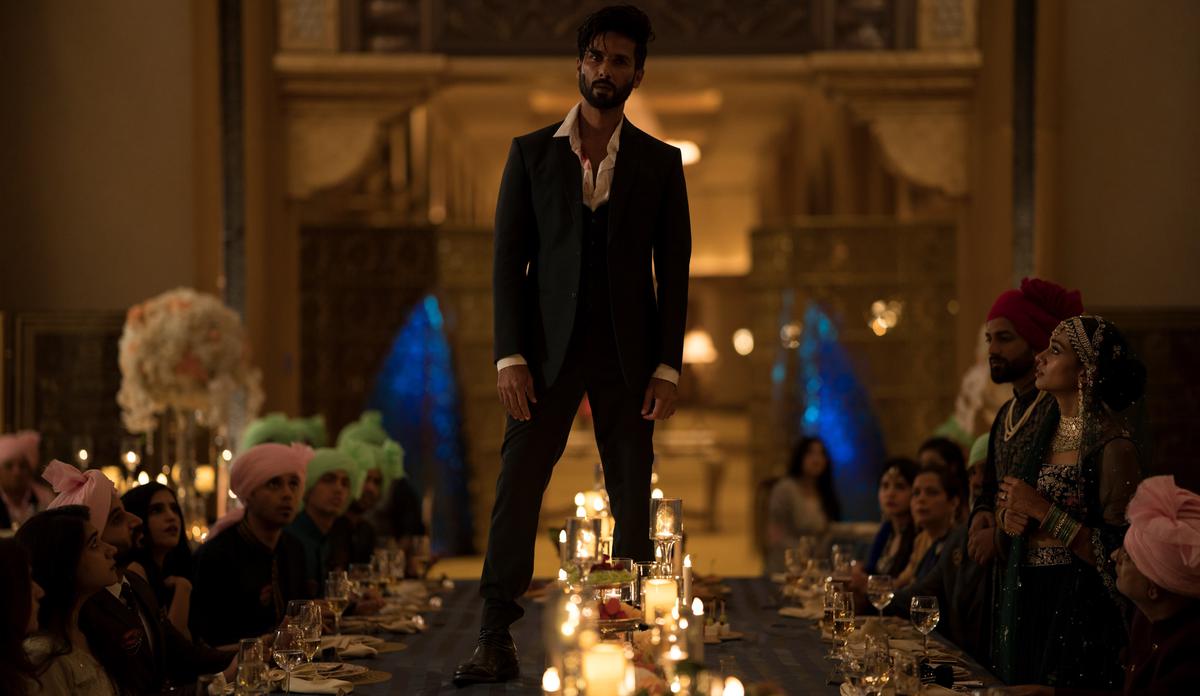Shahid Kapoor on his new film ‘Bloody Daddy’ and 20 years in Bollywood
Just like that, it’s 20 years of Shahid Kapoor. The actor — boyish and bright-eyed — had debuted with Ishq Vishk in 2003, though he had been background-dancing and stage-performing for longer. His career took off in fits and starts. Son of veterans Pankaj Kapur and Neelima Azeem, Shahid stuck to mainstream choices until Jab We Met (2007) and Kaminey (2009) revealed new and variegated shades to the performer. Since then, his filmography has been a hard one to pin down. There is a typical Shahid Kapoor performance — indefatigable, unkempt — but no typical Shahid Kapoor film. He impressed critics with Haider (2014) and Udta Punjab (2016), then baited them with Kabir Singh (2019).

Shahid Kapoor in a scene from ‘Bloody Daddy’
Earlier this year, Shahid successfully made the leap to OTT with the expansive Raj & DK series Farzi. His new film, Bloody Daddy, an action thriller directed by Ali Abbas Zafar, is also a streaming release, arriving on JioCinema on June 9. Adapted from the French film Nuit Blanche (Sleepless Night, 2011), it finds Shahid, playing a narcotics officer, taking on a Gurugram cartel after they abduct his son. The film was previously remade in Tamil asThoongaa Vanam(2015), starring Kamal Haasan.

‘Bloody Daddy’, adapted from a French film, tells of a narcotics officer’s night in hell
In an interview with The Hindu, Shahid — now 42 and married with two kids — speaks about his nervous beginnings in the industry, his love for edgy and extreme cinema, welding personal experiences into roles and when he might collaborate with Vishal Bhardwaj again.
2003 was a formidable year for Bollywood — Kal Ho Naa Ho, Koi… Mil Gaya, Munna Bhai M.B.B.S., Baghban, Chalte Chalte. As a young newcomer making his debut, what was your state of mind?
Before that year, I remember we had two or three years of complete box-office drought. Everybody told me this was the worst time for a new actor to come. Even star-led films were not working. We were just sh***ing in our pants. But I remember Andaaz and then Ishq Vishk coming and breaking that jinx. Out of which Ishq Vishk was a nothing film. And the rest of the year went really well.
I feel Ishq Vishk worked because it was a film of its time. We presume that the same set of people go and watch different types of films. As you work more, you realise that’s not the case. After a long time it was a movie for the younger lot — the school and college-going kids and the kids in their 20s. And it was starring actors who looked their age and spoke their language. It was an unassuming, non-filmy kind of fun college romance, you know? Before that, the average age of people doing college romances was 48 or 50.
What kind of action cinema did you grow up admiring?
Action is such a broad genre that it can include everything from Goodfellas and Scarface to Inception and Saving Private Ryan. Personally, I love the Terminator and Mission: Impossible franchises. I would pick Mission: Impossible 2 just for the bike stunts featuring Tom Cruise, though I also have a soft spot for Brian De Palma’s 1996 original. I loved Speed (1994), which was one of the first action films Keanu Reeves did. And most of it was set in a bus! I also admire Kill Bill and The Dark Knight.
Shahid Kapoor and Ali Abbas Zafar
When an expensive, star-led vehicle like Bloody Daddy goes directly to digital, the first assumption is that it hasn’t turned out up to the mark. Is that the case?
Why do people still think like that? This film was always meant to be for OTT, from the time we conceived it. We should not think that things that don’t turn out well go to streaming. There was a period during COVID-19 when films needed to release because theaters were shut. People wanted to make this space grow and there was no competition outside. But that phase is over. And it has actually pushed everything into a slightly negative momentum than it was in pre-COVID times. So being quality conscious is something that’s on top of everybody’s mind right now. I would rather not release something than put out work that I think is sub-standard.
Ali and I wanted to build an action franchise for OTT. Because this film is of a certain nature and it lends itself more to the digital platform. There is a certain amount of (strong) language and brutality in the film. It doesn’t have songs or heroines. We wanted to stay pure to the film and not compromise on size and scale. It’s a first-of-its-kind action film for OTT, like Extraction. We don’t see that film and say they just dumped it on OTT. No, it was meant for that. And after Martin Scorsese chose to put out The Irishman as a Netflix original, I think that debate should end. If there is anybody who knows quality, it’s Scorsese.
You’ve never shied away from doing edgy or extreme cinema, unlike actors of the previous generation who had the baggage of being role models.
They also grew up in different times.
Right. You, on the other hand, played a cokehead in Udta Punjab. Your character in Kabir Singh was widely criticised for being a misogynist. Bloody Daddy, likewise, has an abundance of brutal violence…
You wouldn’t ask this in the context of John Wick, would you? Why is it that only Hindi film actors get asked about brutal violence in their movies? Shah Rukh Khan threw Shilpa Shetty off the roof in Baazigar (1993) and people loved him in that film. If something is justified in a story, if it’s done aesthetically, and if it works and gives you a new experience, then you can do it. For me it’s more about quality or calibre. If you are doing shoddy work, if you are acting badly or doing a song that sounds terrible, that is a problem. But if something feels right then you should do it.
Some years ago, on an actors’ roundtable, you asked Ranveer Singh if an improvised moment in Gully Boy was drawn from personal experience. And it turned out to be the case. Do you also take often from life?
I take a lot, but it’s usually quite personal. For instance, in Farzi, my character Sunny is very close to his nanu (Amol Palekar). And so was I with my maternal grandfather (late journalist and author Anwar Azeem) while growing up. My parents were separated so he was a strong father figure in my life. I remember speaking to Raj & DK about the scene in the final episode where Sunny hears his nanu is dead. They wanted me to break down instantly and I said it won’t happen now. It’s too big and it’s too soon. That’s because when my nanu died, I didn’t cry for a day and a half. I was the eldest son and I had to take care of my mother and grandmother. It was much later when I was in his room and saw his wristwatch that I broke down. If you remember the scene in Farzi, it’s Feroz (Bhuvan Arora) who is crying and Sunny has no reaction.
A still from the final episode of ‘Farzi’
Vishal Bhardwaj directed a short film, Fursat, with your brother Ishaan Khatter. Has Ishaan become his new favourite and you the old geezer?
I will give him a run for his money (laughs). Old geezers don’t give up easily. On a serious note, I love both Ishaan and Vishal sir and I was happy to see they collaborated. I am proud of Ishaan and I think he is a really talented actor.
Have you and Vishal discussed another project since Rangoon (2017)?
We keep meeting once in a while. I’m still waiting. There is something we discussed but he has to write it.
For all the latest Entertainment News Click Here
For the latest news and updates, follow us on Google News.
